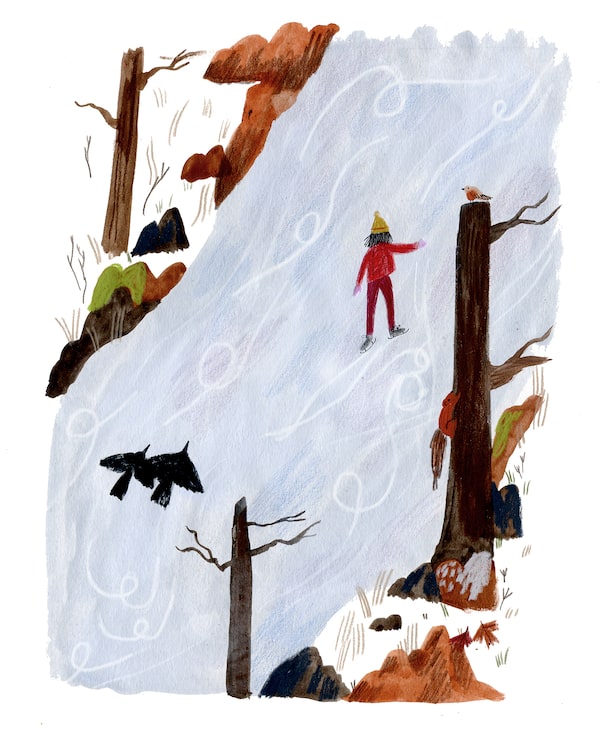
Illustration by Chelsea O'Byrne
First Person is a daily personal piece submitted by readers. Have a story to tell? See our guidelines at tgam.ca/essayguide.
Each year, I watch anxiously for the St. Lawrence River to freeze, to reassure myself that the planet’s warming hasn’t changed everything yet. In some recent winters, to my dismay, it hasn’t frozen at all. Last year it did, but at first the ice wasn’t good enough to skate on, barely solid enough to walk on. When it did freeze properly, a foot of snow immediately covered it. After glumly keeping watch on cycles of melting and refreezing, I awoke one bone-chilling morning to see slick, glossy ice all the way to the horizon. Joyfully, I dug out my skates.
I don’t know why I love skating. I’ve never been particularly good at it. But I grew up on this river and skating was always one of winter’s reliable pleasures. I’ve never seen the point of rink skating, going round and round in circles. River skating, though, is a kind of a miracle – not just walking on water but soaring across it.
Skidding down to the shore on hard, glassy snow, I felt the first twinge of doubt – fear, really. People my age are supposed to avoid icy sidewalks and head indoors at the threat of freezing rain. And here I was, venturing out on what amounted to an iced roadway of epic proportions. If I fell and hurt myself, who would know? At midday on a sunny Sunday, there wasn’t a living soul in sight. Maybe people thought it wasn’t safe to be out on the river. Maybe their lives were just too busy.
My mother skated well into her 70s. On her last time out, she was nearly across to Wolfe Island when she caught her blade in a crack and fell, twisting her knee. She managed to get the rest of the way to the ferry and it brought her back to the mainland. Somebody drove her home. When she announced that she was hanging up her skates, we said she should just get a new pair. Hers dated from the late 1940s and probably hadn’t been sharpened since. No, she said. The experience had shaken her. That part of her life was over.
Maybe it should be over for me, too? But good skating conditions are rarer all the time and I might not have many more chances.
The older I get, the greater my nostalgia for the fabled, long-past days of perfect ice. One extraordinary year when I was 13, the river froze very early, even before the holidays began. By Christmas, we could skate. The surface was black and waxy, six inches thick and so clear we could see through to the bottom. Marvels were revealed there: a foot-long garpike, an eelish creature with a pointed nose and a body not much thicker around than two fingers. And there was the mudpuppy frozen in a drift of ice cubes right on the surface. How on Earth did it get there? We chopped it free with an axe, but it failed to revive.
Every day, all day, the whole neighbourhood was out on the river, dozens of kids. Hockey nets appeared and the air was loud with the thud of pucks on sticks. Somebody had the idea of using bed sheets to sail up and down. We made a landing on a private island and invaded an unlocked cottage until guilt drove us out again.
An older girl showed up with a vintage iceboat, its ancient cockpit padded with a straw-filled mattress. We sat on the cross-pieces, clinging like fleas as we skimmed at breathtaking speed between Cedar Island and the shore. The adventure ended when the boom pinned down our captain’s arm so she couldn’t steer – as we headed straight for a raised pressure crack. Did we swerve or crash into the ridge, kids scattering across the ice? I can’t recall, but everyone lived to tell the tale.
All through that magic time, it never snowed. Then, late on the final Sunday of the holidays, ominous clouds moved in. As the light faded, the wind picked up, piling the thickly falling flakes in drifts. The next day we were back at school and there was never another year like it.
Now more than half a century on, I was alone on the river. I didn’t plan to stray too far from civilization, though, my mother’s mistake. I finished lacing my skates and launched myself, stiffly and tentatively at first, then with more confidence as muscle memory kicked in. Soon I was bowling along like I was 13 again, or maybe 40, passing over green-grey landscapes of river bottom, mossy rock and trailing weed – even an ancient wreck with ribs like a long-dead whale. It felt like flying over a lost country.
When my feet got cold, I turned for home, wind at my back. Suddenly my feet shot out from under me and I went down like a felled tree. My head thwacked hard on the ice. For several minutes I lay there, breath knocked out of me, staring at a bright sky full of stars. “Idiot!” my shaken brain shrieked. “You’ve given yourself a concussion! A broken pelvis!”
The stars cleared. I clambered shakily to my feet and wobbled to shore. I hoped no one had witnessed my humiliating fall from grace. I’d been given a warning.
I’m well-padded, so no bones were broken. Despite what we used to call a goose egg on the back of my skull, I decided I didn’t have a concussion after all. I’d be sore later on, for sure. Nevertheless, I felt more exhilaration than defeat.
And that warning? I’ll keep it in mind as I watch the heat leave the water in dense white clouds, as the first ice skin forms. For now, I’m a skater on the river still.
Maureen Garvie lives in Kingston.